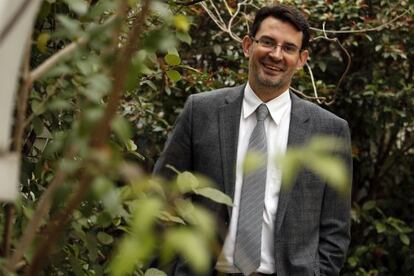Leading neuroscientist joins Spanish science’s brain drain
Problems are structural, says new head of King’s College Center for Developmental Neurobiology says problem

Spanish science is set to lose a second leading light in the space of a month: Óscar Marín, an investigative neuroscientist at the CSIC national research council, has accepted the challenge of heading up the Center for Developmental Neurobiology at King’s College, London. He follows Juan Carlos Izpisúa, a world leader in stem cell research who helped found the Barcelona Regenerative Medicine Center, in abandoning research and development in Spain.
Both scientists gave similar reasons for their decisions. Izpisúa cited a lack of support from both the Catalan and Madrid governments, while Marín said he needed to move abroad because R&D in the country does not have the necessary means for his research to bear fruit. “[The system] does not correspond to what a 21st-century system of investigation should be,” he said.
Huge cutbacks imposed on the science sector from 2009 onward brought the CSIC to the verge of bankruptcy late last year. Spain’s premier research institute, which accounts for almost 20 percent of the country’s scientific output, required an 11th-hour government bailout of 95 million euros to prevent it going under.
Marín studied biology at Madrid’s Complutense University and trained as a neuroscientist in the United States. He returned to Spain in 2003 to work at the Alicante Institute of Neuroscience, which is funded by CSIC and the Miguel Hernández University. There he produced excellent work in the field of inhibitory neurons, “which are the like the conductor of the orchestra of the brain’s neuronal connections,” he explains.
Money is very important, but the problem in Spain is structural. It has to be rebuilt”
Now, to continue his work, the CSIC investigative professor has decided he must head overseas. Marín will take a good part of his team with him, and a 2.5-million-euro grant from the European Research Council, which is assigned to the scientist in question regardless of where they work.
So have cutbacks in Spain forced him out? “Money is very important; the more financing science has the better. But the problem in Spain is fundamentally structural and it is not enough to keep papering over the cracks. It has to be rebuilt.”
Traveling with Marín will be his wife, Beatriz Rico, who is also a CSIC researcher and who has been recruited by King’s College as a senior lecturer. “As a scientist I need new challenges, new stimuli, new partnerships… and King’s College has offered me that. At the moment there is nothing in Spain that will permit me to develop. The Alicante Institute was the culmination of what can be achieved in this country with the tools and structures that we have,” Marín said during an interview with EL PAÍS at the BBVA Foundation in Madrid.
Public investment in R&D in Spain has fallen by around 40 percent over the past five years. Spanish scientists have accused successive Socialist and conservative governments of threatening the long-term viability of the sector in Spain in favor of “short-sighted” austerity policies.
The direct result has been the loss of some of the country's best young scientists to more attractive prospects abroad. “Scientists should not be required to be civil servants,” Marín notes. “Instead there should be a more competitive environment in which excellence is rewarded and distinctions are made between those who work hard and achieve results and those who do not. In science we need more elasticity within the system. The lack of funds is terrible, but it is an economic issue; the obsolete structures will continue to be exactly the same when the crisis passes.”
Tu suscripción se está usando en otro dispositivo
¿Quieres añadir otro usuario a tu suscripción?
Si continúas leyendo en este dispositivo, no se podrá leer en el otro.
FlechaTu suscripción se está usando en otro dispositivo y solo puedes acceder a EL PAÍS desde un dispositivo a la vez.
Si quieres compartir tu cuenta, cambia tu suscripción a la modalidad Premium, así podrás añadir otro usuario. Cada uno accederá con su propia cuenta de email, lo que os permitirá personalizar vuestra experiencia en EL PAÍS.
¿Tienes una suscripción de empresa? Accede aquí para contratar más cuentas.
En el caso de no saber quién está usando tu cuenta, te recomendamos cambiar tu contraseña aquí.
Si decides continuar compartiendo tu cuenta, este mensaje se mostrará en tu dispositivo y en el de la otra persona que está usando tu cuenta de forma indefinida, afectando a tu experiencia de lectura. Puedes consultar aquí los términos y condiciones de la suscripción digital.








































